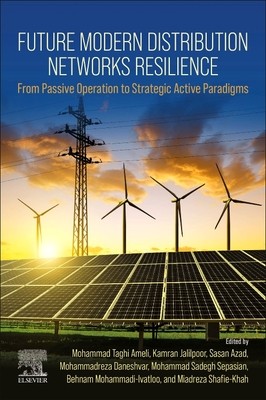
- Išsiųsime per 10–14 d.d.
- Leidėjas: Elsevier
- ISBN-10: 0443160864
- ISBN-13: 9780443160868
- Formatas: 15.2 x 22.9 x 2.3 cm, minkšti viršeliai
- Kalba: Anglų
- Extra -15 % nuolaida šiai knygai su kodu: ENG15
Future Modern Distribution Networks Resilience + nemokamas atvežimas! | knygos.lt
Atsiliepimai
Aprašymas
Future Modern Distribution Networks Resilience: From Passive Operation to Strategic Active Paradigms examines the combined impact of low-probability and high-impact events on modern distribution systems' resilience. Using practical guidance, the book provides comprehensive approaches for improving energy systems' resilience by utilizing infrastructure and operational strategies. Divided in three parts, Part One provides a conceptual introduction and review of power system resilience, including topics such as risk and vulnerability assessment in power systems, resilience metrics, and power systems operation and planning. Part Two discusses modelling of vulnerability and resilience evaluation indices and cost-benefit analysis. Part Three reviews infrastructure and operational strategies to improve power system resilience, including robust grid hardening strategies, mobile energy storage and electric vehicles, and networked microgrids and renewable energy resources. With a strong focus on economic results and cost-effectives, Future Modern Distribution Networks Resilience is a practical reference for students, researchers and engineers interested in power engineering, energy systems, and renewable energy.
EXTRA 15 % nuolaida su kodu: ENG15
Akcija baigiasi už 1d.16:44:06
Nuolaidos kodas galioja perkant nuo 10 €. Nuolaidos nesumuojamos.

- Leidėjas: Elsevier
- ISBN-10: 0443160864
- ISBN-13: 9780443160868
- Formatas: 15.2 x 22.9 x 2.3 cm, minkšti viršeliai
- Kalba: Anglų
Future Modern Distribution Networks Resilience: From Passive Operation to Strategic Active Paradigms examines the combined impact of low-probability and high-impact events on modern distribution systems' resilience. Using practical guidance, the book provides comprehensive approaches for improving energy systems' resilience by utilizing infrastructure and operational strategies. Divided in three parts, Part One provides a conceptual introduction and review of power system resilience, including topics such as risk and vulnerability assessment in power systems, resilience metrics, and power systems operation and planning. Part Two discusses modelling of vulnerability and resilience evaluation indices and cost-benefit analysis. Part Three reviews infrastructure and operational strategies to improve power system resilience, including robust grid hardening strategies, mobile energy storage and electric vehicles, and networked microgrids and renewable energy resources. With a strong focus on economic results and cost-effectives, Future Modern Distribution Networks Resilience is a practical reference for students, researchers and engineers interested in power engineering, energy systems, and renewable energy.




Atsiliepimai